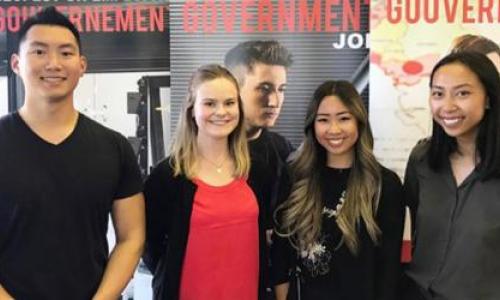
Saraan interviews Co-op students, So Hyun Park, Roop Gill, and Haoyang Zhang about what it was like applying and seeking for their first Co-op work term. They share the challenges they faced during their seeking semesters and their advice for other fellow students who are pursuing their first Co-ops.
What Challenges Can You Expect to Face?
When I spoke to my interviewees, it was clear that seeking Co-op definitely has its own ups and downs. These students faced certain challenges that most co-op students can expect to face during their own seeking semesters. These included facing rejections, having a hard time balancing the workload, convincing parents about pursuing Co-op and working on their speaking and writing skills.
So Hyun in particular had a tough time dealing with rejection. She shared that “the most challenging part for me was going for interviews that went great and coming back home to find out that I was rejected. Even though in my mind, I thought I might get the job because the interview went really well, in reality, it didn’t. It made me feel like I wasn’t good enough and it also lowered my self-esteem. So I pushed myself harder to work on my portfolio and improve my skills.”
Rejection Is Hard to Accept, So Having Realistic Expectations Is Crucial
You might have certain expectations about how the process might look like, but just as Roop points out, those expectations sometimes might not be met. She mentions that, “before I actually got into the Co-op program, I was in the impression that first I would finish the resume workshop, followed by the cover letter workshop and then I would kind off be done. But it wasn’t like that. There was a lot more to do then I anticipated. I had to apply to multiple jobs and for every position, I needed a separate cover letter and resume which was really time-consuming for me. And on top of that, balancing school along with the seeking process was quite challenging and I surely underestimated the work I would have to put it.”
On the other hand, Hoayang had her own set of struggles. She mentions that “as an international student, my parents did not understand the importance of doing Co-op. They wanted me to concentrate on school and get a higher GPA rather than spending time working. They are kind of like traditional Chinese parents and so I had to convince them that doing a Co-op was important as well because it is crucial for my future career plans and will help me secure a job after graduation. After some convincing, they were on board”.
She also pointed out that her English speaking and writing skills were a challenge for her as well because she was competing with other students who she believed were better at those skills.
How Can You Overcome These Challenges?
At this point, you might be wondering about how to overcome these challenges that may come along the way. Here are a few things you can do:
1. Take Rejections as an Opportunity to Improve Yourself
When asked about this question, So Hyun said, “I remember one time, the interviewer wasn’t even ready to look at my portfolio and bluntly told me that I wasn’t qualified enough. I was extremely upset and mad about the experience but I turned it into motivation which really pushed me to work on my portfolio even more. Even when I got rejected, I took this as an opportunity to keep focusing on my work and tried not to get too upset about it.”
2. Focus on the Quality of the Application and Not the Quantity
An easy way to lower your workload during applying for jobs is to work on the quality of the applications. This worked for Roop because she was able to secure her first Co-op by applying for only 8 jobs.
She remarked, “Invest your 100% in every application you submit. Do your research about the employer and make sure you are improving along the way and making changes to your application when needed.”
3. Set Career Goals to Keep You Motivated
You might find yourself demotivated at times and maybe wanting to give up. Haoyang felt the same, but she had an ultimate goal that fueled her along the way. “I think setting career goals was really helpful for me. That is what I did and that is what kept me motivated throughout my journey. I knew that getting a Co-op will help me get some clarity about my future and will help me get a job after I graduate”
Tips for Students Who Are Currently Seeking for Their First Co-op:
So Hyun, Roop and Haoyang shared some advice for co-op students who are seeking their first Co-ops. I have condensed it down to the top 6 tips they shared.
1. Get Feedback From Co-op Advisors. Get valuable insight and suggestions to improve on for your resume and cover letter. Book one-one prep interviews to practice your communication and interview skills.
2. Ask for Help From Your Friends. Your friends can be great resources when it comes to getting help. If they have previously done a Co-op, ask them for specific tips and tricks from their field that you can use.
3. Get Feedback From the Employer. Once you get an answer from the interviewer, you could follow up asking for places you could have improved on.
4. Consider Part-time Co-ops or Jobs. This way you can build your experience and work towards getting your dream job.
5. Volunteer and Get Involved on Campus. Employers consider these as valuable experiences as well, so don’t forget to add it to your resume.
6. Make Use of Online Resources. You can find great resources on these topics on YouTube, Udemy, Coursera and OLC. So, make sure to use them!
When asked if the Co-op experience was worth the effort, all three Co-op students agreed with no hesitation. They also remarked that they would take a shortcut if they could, but the reality is that there really isn’t one. Their experiences go to show that there will be challenges along the way, but the more you know what’s to come, the better you will be prepared for it.















